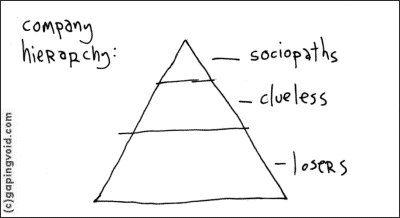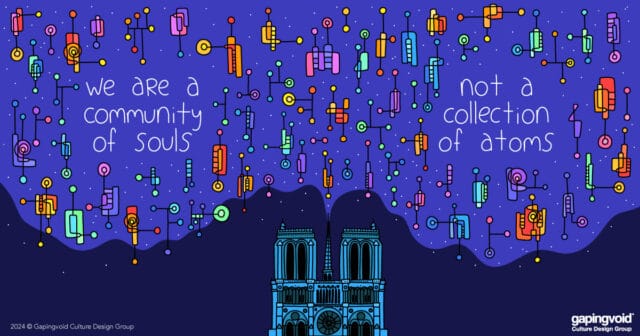
My friend, Shel Israel is doing some consulting work for the large German ERP software firm, SAP. To aid the cause I answered ten questions about social media that he e-mailed to me. Here they are below:
1. You’ve been around the social media scene for a long time. How has it emerged from your perspective?
It has emerged very unevenly, yet constantly. Six years of blogging later, and I still am utterly unable to predict what or who is going to be “the next big thing”. Will Twitter win? Or Jaiku? Something else? Nobody knows. A year ago MySpace looked unstoppable. Now there’s Facebook. Three years ago LinkedIn was all the rage. What will happen to Google in 10 years? Your guess is as good as mine. Sometimes it’s just easier to wait for the future to arrive on your doorstep than to try to foresee events.
2. Where do you think social media will be going over the next 5-10 years?
I think it will continue to gravitate to where it has always gravitated towards i.e. Faster, Cheaper and Easier.
The most interesting thing to me recently has watching the peaking of blogs. For a couple of years there they were the biggest story in media. Now their cultural influence seems a lot smaller. People finally figured out that yes, doing a blog well is actually very time consuming. Not everybody wants to be Robert Scoble– Hell, I’m not sure if Scoble wants to be Scoble all the time, either [Joke!]. Which created a lot of opportunities for less time-consuming web products.
This is us seeing Social Media evolving way from the time-guzzling “Celebrity Model”, where people emulate “broadcasters” on a small scale, towards something that is far more useful to most people i.e. something that allows people to make friends and talk to their friends more easily.
This is why I find Facebook so interesting. The fact that it was invented by college students doesn’t surprise me.
Think about it. Every college kid has a tight-knit group of friends [Think, for example, Animal House or St. Elmo’s Fire}. Facebook was designed from the very beginning to allow groups of pre-existing friends like these to communicate with each other better. Quite different from the “broadcast model” of blogs. It’s more collegiate.
3. How is social media emerging in the UK and EU v the US?
The UK blogging scene always struck me as relatively smaller and geekier than the US scene. Brits have always struck me as more cautious at embracing the internet compared to the Americans, and I imagine this will continue. That being said, the London Facebook network is the second largest in the world, bigger than New York’s. I’m guessing this means they don’t mind using social media for the FRIENDS THEY ALREADY HAVE, and are less willing to use Social Media to make new “online friends”. Then again, the French really took to blogging, I suppose because it’s an ideal medium for people with strong opinions- and the French do like a good, strong conversations. The Germans I understand never took to blogging on the same level as the French or the Brits, however I’m told they’re really into Wikipedia- a more collaborative medium that respects and defers to authority.
I met a lot of really great bloggers in Denmark, the couple of times I’ve been there. Really smart and passionate. I suppose when you live in a very small country with few resources, the incentive to adopt an extremely cheap and easy global medium is huge. Similar to why it helps to learn English.
4. Let’s narrow the conversation down to business. Are European businesses
embracing social media? What about just in the UK?
E-mail is a part of office life. Nobody questions its function [even when one has 800 unread e-mails waiting in one’s inbox]. We’re not quite at that stage yet with Social Media. The vibe I get from corporates who ask me questions at conferences is not one of certainly and enthusiasm, but more of a head-scratching, “Well, everybody else seems to be doing it, this is kinda the future, so I suppose I should be paying more attention, but…” I hear the word “But” a lot. It’s still early days. In five years time I expect to be hearing “But” a lot less.
5. What tools are they embracing? Do various cultures impact the tools that
are gaining in popularity?
They are embracing all sorts of tools. There a lot of them out there, and nobody, repeat nobody can predict how much traction they’ll eventually get inside a company culture. So what the savvy social software engineer will do is try lots of things and see which snowball rolls all the way down the hill, rather than put all of the eggs into a single, oversized basket.
6. Do you see a difference in the way global enterprises are embracing
social media v. small to medium sized businesses?
Big businesses will always have trouble with anything that subverts hierarchies, for hierarchy is the glue that holds large organizations together. Small businesses have an easier time with blogs and whatnot, for there are fewer layers to keep happy. Secondly, small companies are for the most part private companies. Large companies generally have public shareholders. Different rules apply.
7. What similarities/differences do you see between C-level acceptance of
social media and mid-management?
Mid-Management is in the unfortunate situation of wanting to “get it”, knowing it’s the future, whilst at the same time, they’re paid to maintain the status quo. One thing management often underestimates is JUST HOW DISRUPTIVE social software is. I see lots of pain in that future. Hopefully it’ll end up being worth it in the long run.
The main impact Social Media has brought to me was seeing my business model, over a period of about five years, evolving from a “Hierarchy” privilege model to what Jon Husband calls a “Wirearchy” model.
I started my career in the advertising business, working as a “creative”. Back in the 1990s, there was very much a pyramid-shaped hierarchy in that industry, with “rock stars” on the top, and the “grunts” on the bottom. Every creative’s business model seemed to be about getting the rock stars to notice you. In order to get paid noticeably more money you had to do all the normal stuff- win awards, land a job in a “sexy” agency, get your ad on to The Superbowl etc. Everyone knew who the rock stars were. Everyone knew what they were up to. And all you could do is hopefully one day get the opportunity to make your mark, the same way the rock stars had- INSIDE the existing pyramid.
Now, as a blogger, I feel completely oblivious to all that. Now I have a unique social network, kept coherent with Social Software, where the business model is not about rising up some imaginary status ladder, but “mashing up” people I know.
For example, I have people in my network who work in the wine business. I have people in my network who work for Microsoft. So maybe one day I’ll end up doing something wine-related with Microsoft. Or not.
Suddenly I find myself without “50 people who want to take my job”, simply because what I do is unique to myself, unique to my own social network. It’s as unique as any human fingerprint. And the positive effect is has had on my own personal sense of sovereignty is staggering.
So let’s say over the next, I dunno, ten, twenty, fifty years, this social network paradigm gets more prevalent. Will we still need large companies? Will we still be able to compete with all that unwieldy, energy-guzzling, calcifying corporate structure? Or will everything become “a loose confederation of skunk works”?
It’s too early to tell, of course. Instead, focus on this: The main story about social software is not about how it allows you to carry out existing company functions, just more quickly and easily. It’s bigger than that. In the future, companies will grow around social software, not the other way around. And your client, SAP, had better be ready for this. Because it’s already starting to happen.
8. What are the biggest barriers to social media acceptance in EU business?
The barriers are the same as they’ve always been. Dinosaurs have a lot of money and power. And dinosaurs don’t like dying.
9. How is social media changing culture?
Social media can only change the culture to the extent that it can change the nature of work. Which, as it’s already starting to happen on a huge scale, is actually quite a lot.
10. Additional Comments?
One more thought, which pertains directly to your client. I firmly believe that the line that separates social media and ERP is going to start getting VERY blurry, and really soon. I can see a not-to-distant future where even the larger ERP solutions are built around social software, not the other way around. And I can see that day arriving in under five years. We live in interesting times.
[UPDATE:] Sigurd pipes in on Point Number 10:
As software “models real life as we see it” the ERP train picked up the well structured processes and left the loose ends to fight for themselves. But yesterday Hugh argued “that the line that separates social media and ERP is going to start getting VERY blurry, and really soon… I can see a not-to-distant future where even the larger ERP solutions are built around social software, not the other way around”. And I agree simply for the reason that they should be one, there are no reasons why the world puts a line in the sand between structured and loose ends processes.
Actually it boils down to the definition of what “social software” is.
Social software “enables people to rendezvous, connect or collaborate”.
But a short circuit happens in our brains when we “see” what social software is using those three terms: It invokes the image of an open marketplace or gathering where the efficiency requires freedom and little structure and thus quite the opposite of what ERP entails.
[UPDATE:] SAP’s Thomas Otter pipes in about the false distinction between “business software” and “consumer software”:
Creating barriers to entry through complexity is not a viable strategy. Creating competitive advantage through simplicity and fun is. Widgets, mashups, tagging, community and so on are not just cute. They are fundamental to the future of enterprise applications. It isn’t just the technology, it is the mindset.



